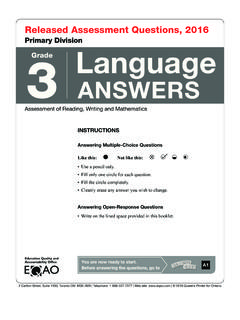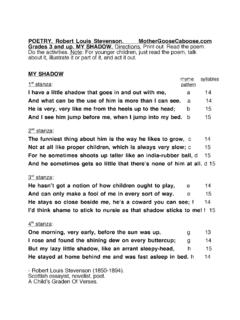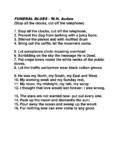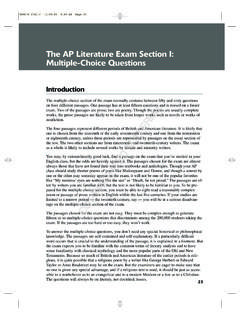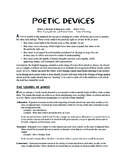Transcription of RAPTURE - CRITICAL VIEWS WHAT THE PAPERS SAID
1 1 RAPTURE - CRITICAL VIEWS what THE PAPERS SAID The effortless virtuosity, drama and humanity of Carol Ann Duffy's verse have made her our most admired contemporary poet. RAPTURE , her seventh collection, is a book-length love-poem, and a moving act of personal testimony - but what sets these poems apart from other treatments of the subject is Duffy's refusal to simplify the contradictions of love, and read its transformations - infatuation, longing, passion, commitment, rancour, separation and grief - as either redemptive or destructive. RAPTURE is a map of real love, in all its churning complexity; simultaneously direct and subtle, with poems that will find deep resonance in the experience of most readers, it is a collection that can and does speak for us all.
2 'These poems are outstanding; intellectually and emotionally complete, popular as love poems perhaps should be and can be, they are also masterly examples of poetic form .. RAPTURE is brilliant, beautiful, and heart-aching' - Jeanette Winterson, The Times. 'A passionate and beautiful new book-length love affair in verse ..Ruthless, sensuous, tender; utterly modern, utterly classical, it's fantastic to see one of our best and most popular poets going from strength to strength in subtle literary originality, while making poems that will sound sweetly to all' - Ruth Padel, Independent . ' RAPTURE is that rare thing - a poetry book that can (and should) be read from start to finish.
3 As the latest Carol Ann Duffy collection it is magnificent; as an examination of modern love and how it shapes us as human beings, it is unparalleled . Scotsman Carol Ann Duffy's collection, RAPTURE , also owes something to fairy tales. Its red-ribbon bookmark and sumptuous cover, a silver-gilt scene depicting some of the book's subject matter - a heron, shooting stars, a woman with arms outstretched to a crescent moon - suggest it could be an old children's book, and Duffy is not afraid to use techniques familiar from nursery rhymes and ballads: repetitions, choruses, full rhymes. But these are adult poems, tracking the trajectory of a love affair through infatuation, love, domesticity and bliss to abasement, arguments, and a break-up.
4 The final poem has an epigraph from Browning, about the "wise thrush" that "sings each song twice over" to "recapture / The first fine careless RAPTURE !" and the book ends with the admission that the poems are a way of reliving events, "a gift, the blush of memory". The danger in RAPTURE is that the singularity of the subject matter could become relentless, and this danger is heightened by Duffy's recurrent use of certain images: stone, moon, charm, star, heart, gift, trees, bones. But actually, contrarily, the book works cumulatively, and the poems take on the strange power of charms, spells, incantations. In the hands of a lesser technician, the self-imposed limits on the language might mean tedium, but Duffy makes each poem sing an intricate, delicate song.
5 She is also aware of the difficulties in trying to make the oldest emotion fresh: she finds the words at the back of a drawer, and rubbed at them till they gleamed in my palm - I love you, I love you, I love you - / as though they were new. In "The Love Poem", Duffy lifts lines from Barrett Browning, Marlowe, Shakespeare, Wyatt, Sidney, Campion, Donne, the Song of Solomon and Shelley, and this awareness of the love poem's heritage allows Duffy to make new ones. Many of the individual poems here stand easily beside the best of her writing. There are brilliant parables like "Give", the domestic snapshots of "Tea" and "Chinatown", or the eerie chant of "Betrothal", which marries Thanatos to Eros, and owes as much to Myra Hindley as Philip Sidney.
6 There is an exceptional fluidity and grace about these poems and, using only the simplest language, Duffy can still spring a verse on the reader that is startling: If I was dead, / and my bones adrift / like dropped oars / in the deep, turning Telegraph 13 Nov 2005 2 Reading RAPTURE . An Introduction Duffy s poetry is rooted in common experience, but its accessibility belies its complexity and richly allusive nature. While clearly speaking in a highly distinctive modern voice, Duffy is acutely aware of the heritage of English, American and European poetry. A number of her poems deal with the limitations, as well as the possibilities of language.
7 It is notable that Duffy frequently draws attention to its inability to convey what human beings wish to express. Duffy s use of LANGUAGE: Duffy s use of language is much noted for its resistance of the studiously poetic. She succeeds in writing in an immediately recognizable and accessible idiom. Her diction reflects the fact that she is able to articulate what ordinary people feel. This is not to suggest, however, that her poems are simple. She uses straightforward language in complex ways. Her lyrics articulate sentiment in a memorable way but they are never sentimental. They have the authentic sound of the modern but are never in danger of being ephemeral.
8 I tried to make the language of poetry coincide with that of passionate, normal speech. I wanted to write in whatever language comes most naturally when we soliloquise, as I do all day long, upon the events of our own lives or of any life where we can see ourselves for the moment. Essays and introductions, p521 Language itself is explored by Duffy as a system of communication, signification and, sometimes, obfuscation. Her poems often reflect on the inability of words to express what is felt, thought or imagined. Words are, as Heraclitus said, fallible things , but are also, as Terry Eagleton points out, the shared counters of experience.
9 Language becomes a system that refracts meaning rather than one that truly reflects what the user intends. Duffy articulates this tension very clearly in her poetry. The philosophy of language was a feature of Duffy s undergraduate study and she was particularly interested in Ludwig Wittgenstein (1889-1951), whose Tractatus (1922) deals with the limitations and possibilities of language. One of the most striking features of the Tractatus is its conception of how the limits of language correspond with the limits of thought. The central questions of the Tractatus are: How is language possible? How can anyone, by understanding a sequence of words, say something?
10 And how can another person understand them? His solution was that a sentence that says something (a proposition) must be a picture of reality ; it must show a situation in the world. His picture theory seemed to explain the connection between the signs on the paper and a situation outside in the world. His later Investigations posited the idea that language may be viewed rather like a game whose rules we must learn. Ultimately the signifying power of language is somehow required to live up to the task of articulating what is beyond itself. Themes Childhood Childhood memory and the experience of it. Evokes childhood fears - Sinister child-nightmare references to moon , fields , love , forest , wood and dark.
